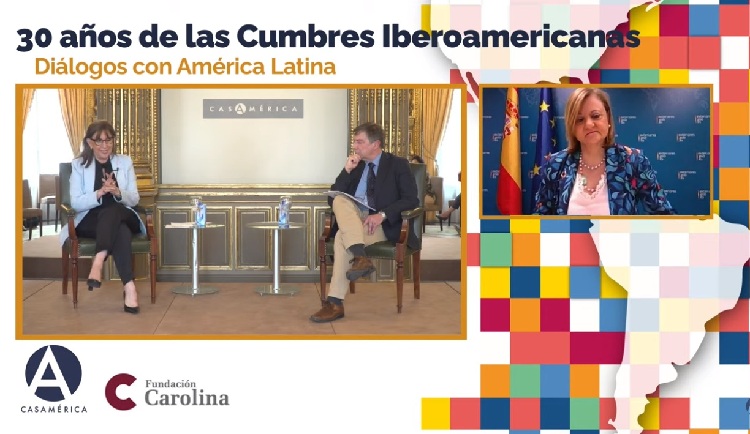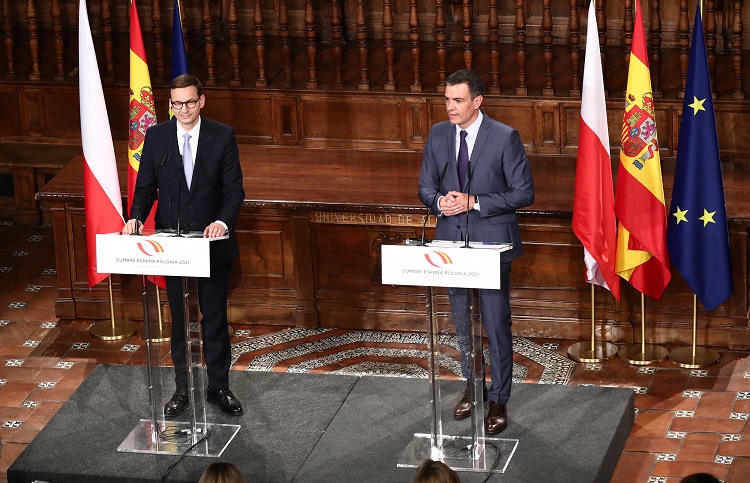Eduardo González
The Secretary of State for Foreign Affairs and for Latin America and the Caribbean, Cristina Gallach, acknowledged yesterday that Spain should “strengthen” its presence in Latin America and contribute to the modernization of the Latin American economy, because at the moment there is “a setback” in Spanish investments that “other countries”, such as China, are taking advantage of.
Gallach made these statements during his participation by videoconference in the event 30 years of the Ibero-American Summits, organized by Casa de America and the Carolina Foundation in the framework of the series Dialogues with Latin America to commemorate the thirtieth anniversary of the first Ibero-American Summit, held in 1991 in Guadalajara (Mexico).
“Our relationship with Ibero-America is systemic, but there is no doubt that we must strengthen our presence in the region”, said the Secretary of State. “It is a very deep relationship, there are more than 2.3 million people living in Spain with dual Spanish and Ibero-American nationality, 850,000 citizens of Ibero-American nationality in Spain and 1.5 million Spaniards in the region”, she continued. “These are extraordinarily important human, historical and cultural ties, but we have to strengthen them”, especially in the political sphere and in the defense of “institutional activity” in some “weak States where democracy and human rights are being broken”, she added, without specifying.
Likewise, Spain must “collaborate in the modernization of the economy of Latin American countries”, since “one of the great factors of the current crisis is the economic crisis in Latin America that came from before COVID”. “Spain and other international actors should contribute to the modernization of the region’s economy, supporting investments and trade,” but “at the moment there is a tendency to withdraw”, she warned. “In 2019, between 25 and 40% of IBEX companies’ revenues depended on their operations in Latin America, but today there is a pullback and others are entering, I believe China”, she added.
For her part, the Ibero-American Secretary General (SEGIB), Rebeca Grynspan, said that the “main achievement” of the 30 years of Ibero-American Summits “has been to maintain the commitment to dialogue, cooperation and peace in the region, something which, when we look at the world we live in, is not a minor element”.
“At the Andorra summit, all countries participated at the political level”, she recalled. “In the political dialogue there are big differences in the region, we cannot hide them, multilateralism is not a club of friends” and in Andorra “we said everything we had to say to each other, but at the same time we managed to reach great agreements on important things for the people on relevant issues”, she highlighted. “We talked about health and vaccines, about recovery after the pandemic, about what to do together to achieve environmental sustainability and about the climate change that affects the region so much and, despite the difficult political dialogue, we managed to reach consensus on a declaration, a commitment to innovation and 16 special communiqués proposed by the countries”, which “reflects a very strong commitment”, she concluded.
The moderator of the event, the director of the Carolina Foundation, José Antonio Sanahuja, highlighted the important role of the Ibero-American summits in the current “period of political polarization between countries and within countries”, which allows “forging important agreements on many issues”, such as recovery after pandemics or the “promotion of talent mobility”. “As the COVID-19 pandemic has shown, the space for the exchange of scientific knowledge is necessary to face collective challenges”, added the director of the Carolina Foundation, the public-private entity of the Spanish foreign action for the promotion of cultural relations and cooperation in educational and scientific matters between Spain and the countries of the Ibero-American Community of Nations.







